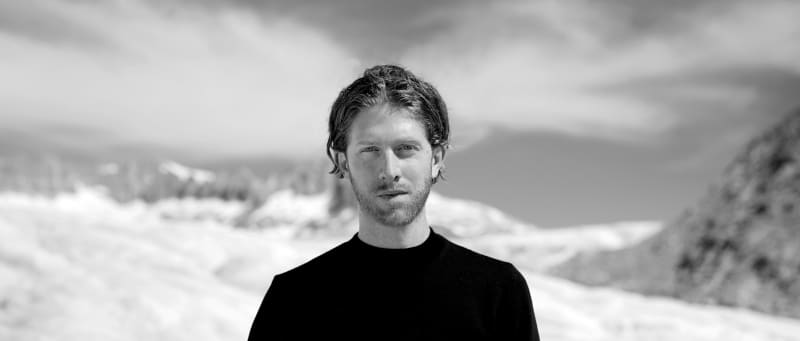Douglas’ latest artistic work, titled Gravity Flow, pushes his artistic expression into a new medium. A sculptural work developed as a public installation displayed in Swiss nature meant to address the urging topic of climate change and its visible impact on Swiss glaciers, visibly receding from melting as a result of the passing of time and climate change. Gravity Flow is a series of five sculptures – made of recycled glass – presented as a representation and exploration of glaciers, questioning how humans perceive, represent and interact with their natural surroundings. By choosing to represent glaciers, Mandry transmits a time-sensitive message about the unprecedented rate at which climate change occurs and its impact in a very visual way.
Gravity Flow is a reference to a constant motion caused by a perpetual force – an ode to the flowing of time. The sculptures reproduce the contours of cavities that can be found beneath the surface of glaciers. These glacier mills are formed by meltwater streaming downwards, gradually carving hollow spaces within the ice – the result of the acceleration of climate change. To study the shape of these cavities, Mandry joined ETH’s Glaciology department Professor Daniel Farinotti on an expedition to the Rhône glacier in Switzerland. By introducing a 3D scanner into the shafts, the researchers gathered the necessary data to create a digital model of several mills that inspired the shape for the final artworks. A knowledge the Glaciology experts conferred to Douglas Mandry to bring together art and science and collectively explore an impactful response to climate change.
Mandry chose recycled glass as a way to express the ever-changing state of matter and to generate an upside-down, positive copy of the glaciers mills’ model. Working with a Swiss glass craftsman, Mandry used recycled glass to create these majestic sculptures that address not only the need to think more sustainably but also the fragility in materiality.
Gravity Flow will be exhibited outdoors on the Muottaz Muragl peak, in the Swiss mountains of Engadine for a full year, from August 2022. By presenting his work in a natural setting, Mandry not only exposes it to the changing meteorological conditions that might alter its appearance, but he also invites visitors to experience art in the open air. As with a glacial erratic, the encounter with this translucent form, similar to a block of ice, has something surreal that awakens our curiosity and encourages us to reflect on our environment, on the current situation of glaciers and what actually happens below their surfaces. The sculptures, from glacial mills coming originally from the Rhône glacier, are intentionally placed in another glacial area of Switzerland. Like boulders, erratic stones transported by the melting ice over thousands of years, the sculptures underline this slow shift from one place to another and crystalises them into one moment in time.
In his work, Mandry emphasises the temporal dimension. The notion of time inevitably brings to mind the question of material preservation, be it of natural resources or of cultural artefacts.
All rights reserved © Douglas Mandry Studio


